Contemporary Hospitality: Ramada Hotel's Analysis of Industry Trends
VerifiedAdded on 2020/12/24
|8
|1434
|229
Report
AI Summary
This report provides a comprehensive analysis of the hospitality industry, specifically focusing on Ramada Hotel. It begins with an introduction to the industry and the chosen organization. The first task involves a PESTLE analysis, examining the political, economic, social, technological, environmental, and legal factors affecting Ramada. The second part of the task includes a SWOT analysis, identifying Ramada's strengths, weaknesses, opportunities, and threats, and discusses how these factors influence the decision-making process. The report then explores current and potential trends in the hospitality sector, including globalization, safety and security, and technological advancements. The conclusion summarizes the key findings, emphasizing the importance of understanding the external environment and adapting to industry trends. The report is supported by relevant references, providing a solid foundation for the analysis.
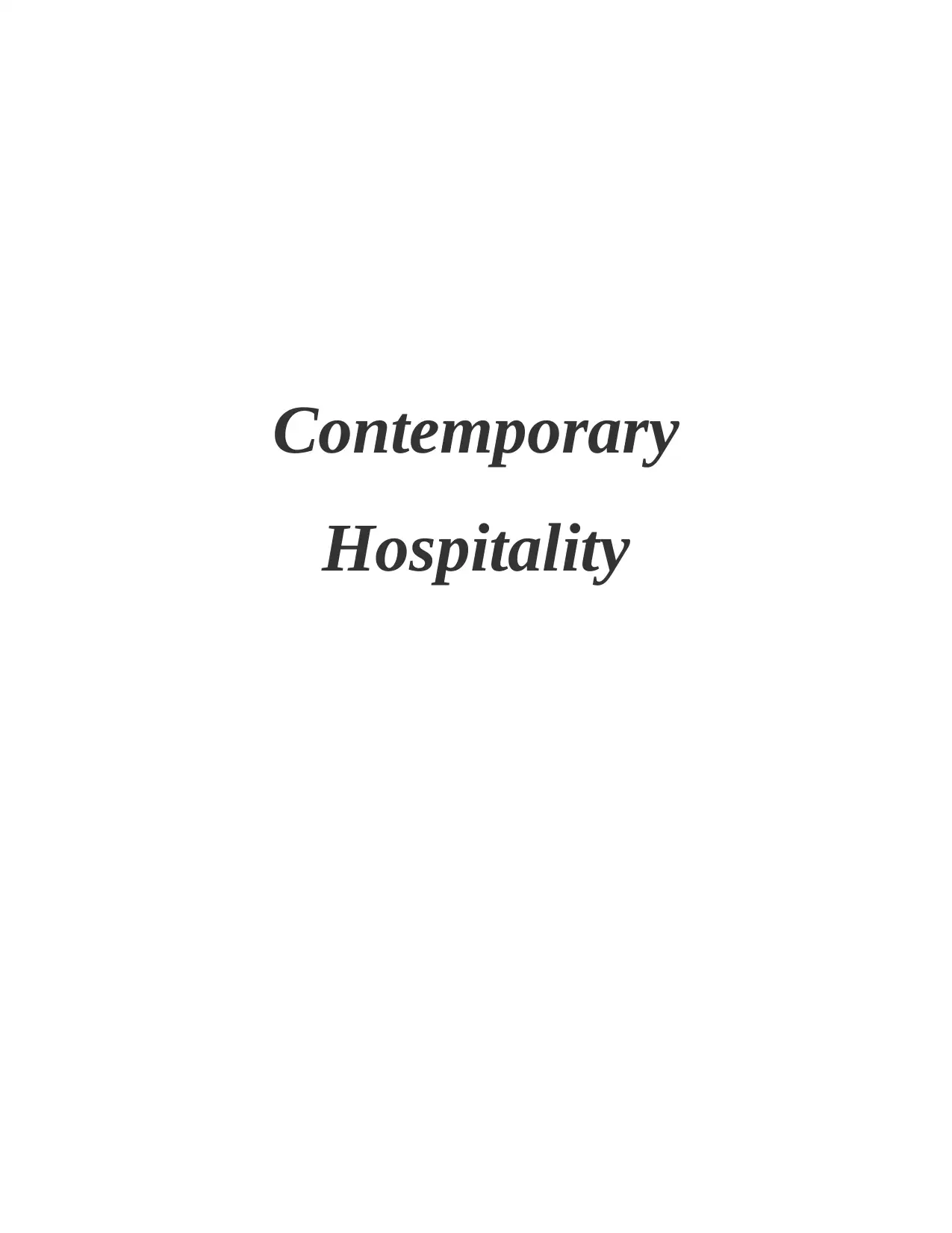
Contemporary
Hospitality
Hospitality
Paraphrase This Document
Need a fresh take? Get an instant paraphrase of this document with our AI Paraphraser
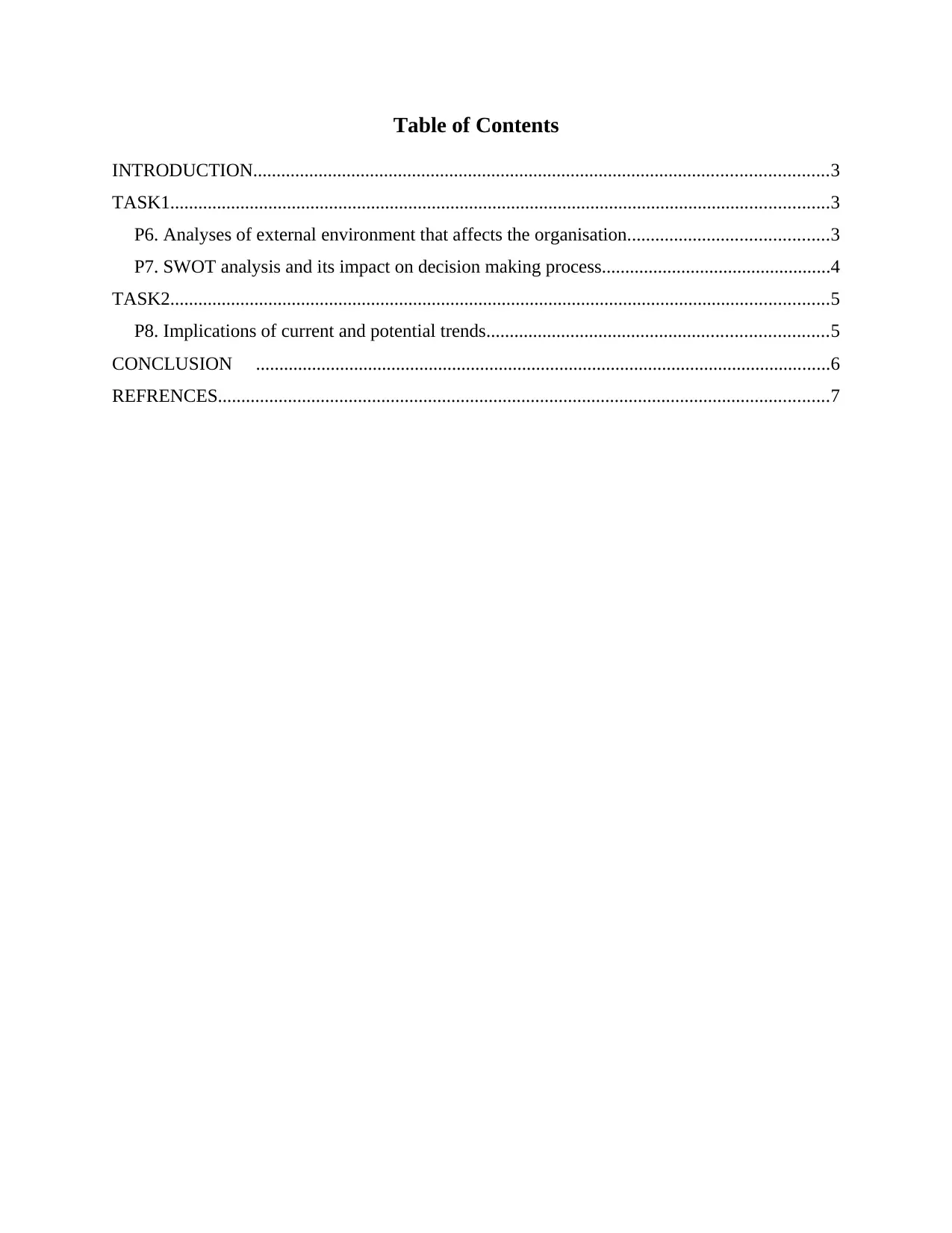
Table of Contents
INTRODUCTION...........................................................................................................................3
TASK1.............................................................................................................................................3
P6. Analyses of external environment that affects the organisation...........................................3
P7. SWOT analysis and its impact on decision making process.................................................4
TASK2.............................................................................................................................................5
P8. Implications of current and potential trends.........................................................................5
CONCLUSION ...........................................................................................................................6
REFRENCES...................................................................................................................................7
INTRODUCTION...........................................................................................................................3
TASK1.............................................................................................................................................3
P6. Analyses of external environment that affects the organisation...........................................3
P7. SWOT analysis and its impact on decision making process.................................................4
TASK2.............................................................................................................................................5
P8. Implications of current and potential trends.........................................................................5
CONCLUSION ...........................................................................................................................6
REFRENCES...................................................................................................................................7
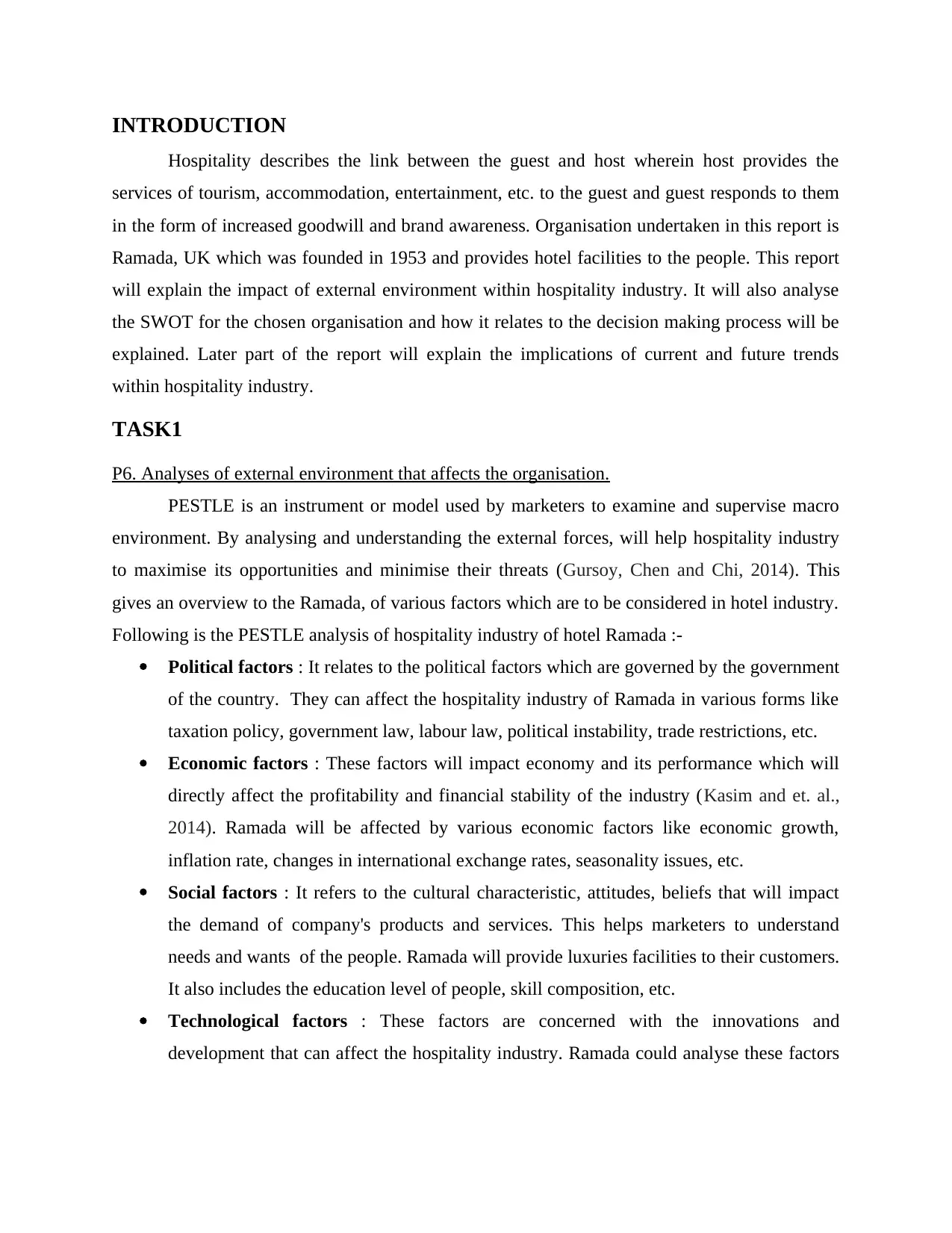
INTRODUCTION
Hospitality describes the link between the guest and host wherein host provides the
services of tourism, accommodation, entertainment, etc. to the guest and guest responds to them
in the form of increased goodwill and brand awareness. Organisation undertaken in this report is
Ramada, UK which was founded in 1953 and provides hotel facilities to the people. This report
will explain the impact of external environment within hospitality industry. It will also analyse
the SWOT for the chosen organisation and how it relates to the decision making process will be
explained. Later part of the report will explain the implications of current and future trends
within hospitality industry.
TASK1
P6. Analyses of external environment that affects the organisation.
PESTLE is an instrument or model used by marketers to examine and supervise macro
environment. By analysing and understanding the external forces, will help hospitality industry
to maximise its opportunities and minimise their threats (Gursoy, Chen and Chi, 2014). This
gives an overview to the Ramada, of various factors which are to be considered in hotel industry.
Following is the PESTLE analysis of hospitality industry of hotel Ramada :-
Political factors : It relates to the political factors which are governed by the government
of the country. They can affect the hospitality industry of Ramada in various forms like
taxation policy, government law, labour law, political instability, trade restrictions, etc.
Economic factors : These factors will impact economy and its performance which will
directly affect the profitability and financial stability of the industry (Kasim and et. al.,
2014). Ramada will be affected by various economic factors like economic growth,
inflation rate, changes in international exchange rates, seasonality issues, etc.
Social factors : It refers to the cultural characteristic, attitudes, beliefs that will impact
the demand of company's products and services. This helps marketers to understand
needs and wants of the people. Ramada will provide luxuries facilities to their customers.
It also includes the education level of people, skill composition, etc.
Technological factors : These factors are concerned with the innovations and
development that can affect the hospitality industry. Ramada could analyse these factors
Hospitality describes the link between the guest and host wherein host provides the
services of tourism, accommodation, entertainment, etc. to the guest and guest responds to them
in the form of increased goodwill and brand awareness. Organisation undertaken in this report is
Ramada, UK which was founded in 1953 and provides hotel facilities to the people. This report
will explain the impact of external environment within hospitality industry. It will also analyse
the SWOT for the chosen organisation and how it relates to the decision making process will be
explained. Later part of the report will explain the implications of current and future trends
within hospitality industry.
TASK1
P6. Analyses of external environment that affects the organisation.
PESTLE is an instrument or model used by marketers to examine and supervise macro
environment. By analysing and understanding the external forces, will help hospitality industry
to maximise its opportunities and minimise their threats (Gursoy, Chen and Chi, 2014). This
gives an overview to the Ramada, of various factors which are to be considered in hotel industry.
Following is the PESTLE analysis of hospitality industry of hotel Ramada :-
Political factors : It relates to the political factors which are governed by the government
of the country. They can affect the hospitality industry of Ramada in various forms like
taxation policy, government law, labour law, political instability, trade restrictions, etc.
Economic factors : These factors will impact economy and its performance which will
directly affect the profitability and financial stability of the industry (Kasim and et. al.,
2014). Ramada will be affected by various economic factors like economic growth,
inflation rate, changes in international exchange rates, seasonality issues, etc.
Social factors : It refers to the cultural characteristic, attitudes, beliefs that will impact
the demand of company's products and services. This helps marketers to understand
needs and wants of the people. Ramada will provide luxuries facilities to their customers.
It also includes the education level of people, skill composition, etc.
Technological factors : These factors are concerned with the innovations and
development that can affect the hospitality industry. Ramada could analyse these factors
⊘ This is a preview!⊘
Do you want full access?
Subscribe today to unlock all pages.

Trusted by 1+ million students worldwide
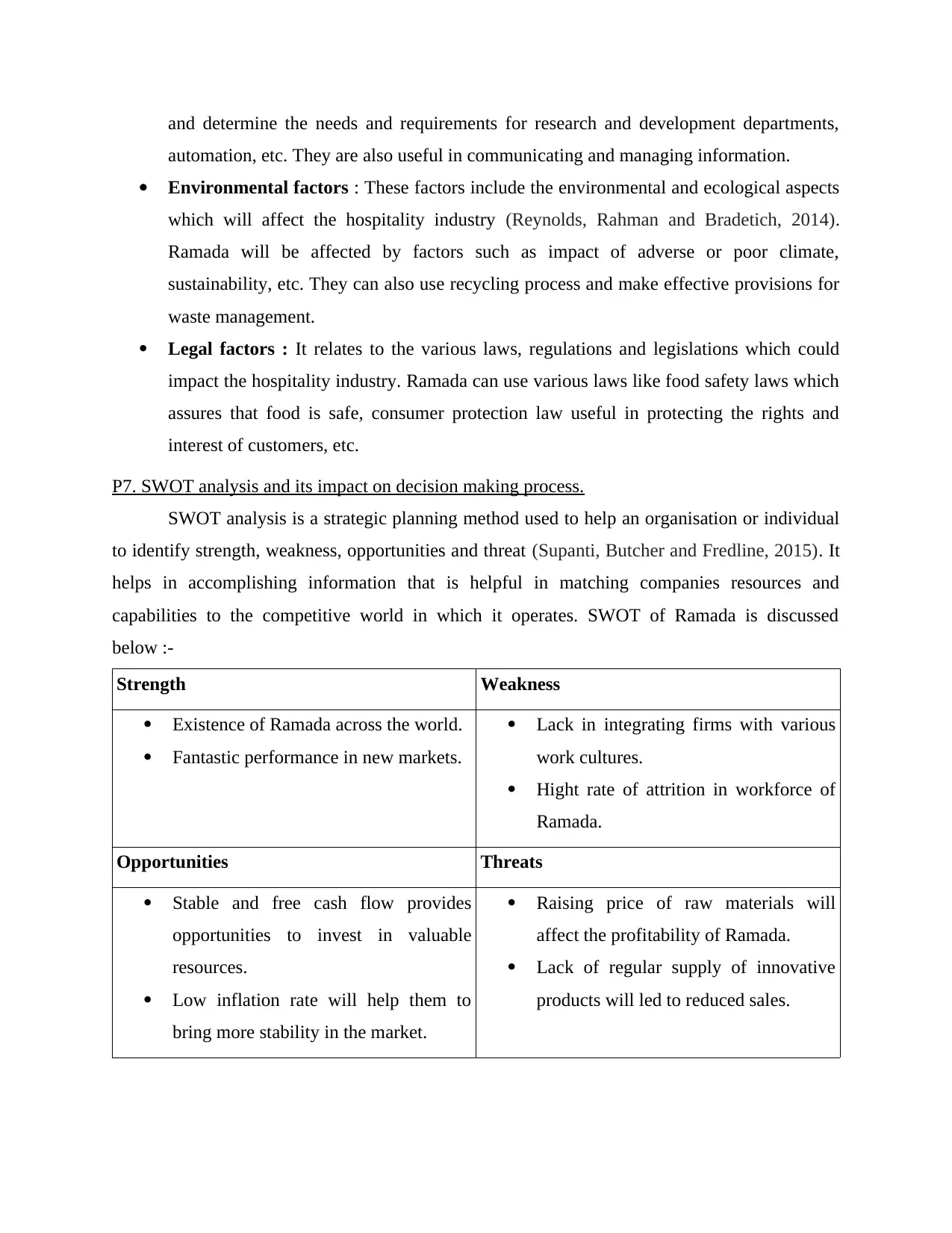
and determine the needs and requirements for research and development departments,
automation, etc. They are also useful in communicating and managing information.
Environmental factors : These factors include the environmental and ecological aspects
which will affect the hospitality industry (Reynolds, Rahman and Bradetich, 2014).
Ramada will be affected by factors such as impact of adverse or poor climate,
sustainability, etc. They can also use recycling process and make effective provisions for
waste management.
Legal factors : It relates to the various laws, regulations and legislations which could
impact the hospitality industry. Ramada can use various laws like food safety laws which
assures that food is safe, consumer protection law useful in protecting the rights and
interest of customers, etc.
P7. SWOT analysis and its impact on decision making process.
SWOT analysis is a strategic planning method used to help an organisation or individual
to identify strength, weakness, opportunities and threat (Supanti, Butcher and Fredline, 2015). It
helps in accomplishing information that is helpful in matching companies resources and
capabilities to the competitive world in which it operates. SWOT of Ramada is discussed
below :-
Strength Weakness
Existence of Ramada across the world.
Fantastic performance in new markets.
Lack in integrating firms with various
work cultures.
Hight rate of attrition in workforce of
Ramada.
Opportunities Threats
Stable and free cash flow provides
opportunities to invest in valuable
resources.
Low inflation rate will help them to
bring more stability in the market.
Raising price of raw materials will
affect the profitability of Ramada.
Lack of regular supply of innovative
products will led to reduced sales.
automation, etc. They are also useful in communicating and managing information.
Environmental factors : These factors include the environmental and ecological aspects
which will affect the hospitality industry (Reynolds, Rahman and Bradetich, 2014).
Ramada will be affected by factors such as impact of adverse or poor climate,
sustainability, etc. They can also use recycling process and make effective provisions for
waste management.
Legal factors : It relates to the various laws, regulations and legislations which could
impact the hospitality industry. Ramada can use various laws like food safety laws which
assures that food is safe, consumer protection law useful in protecting the rights and
interest of customers, etc.
P7. SWOT analysis and its impact on decision making process.
SWOT analysis is a strategic planning method used to help an organisation or individual
to identify strength, weakness, opportunities and threat (Supanti, Butcher and Fredline, 2015). It
helps in accomplishing information that is helpful in matching companies resources and
capabilities to the competitive world in which it operates. SWOT of Ramada is discussed
below :-
Strength Weakness
Existence of Ramada across the world.
Fantastic performance in new markets.
Lack in integrating firms with various
work cultures.
Hight rate of attrition in workforce of
Ramada.
Opportunities Threats
Stable and free cash flow provides
opportunities to invest in valuable
resources.
Low inflation rate will help them to
bring more stability in the market.
Raising price of raw materials will
affect the profitability of Ramada.
Lack of regular supply of innovative
products will led to reduced sales.
Paraphrase This Document
Need a fresh take? Get an instant paraphrase of this document with our AI Paraphraser
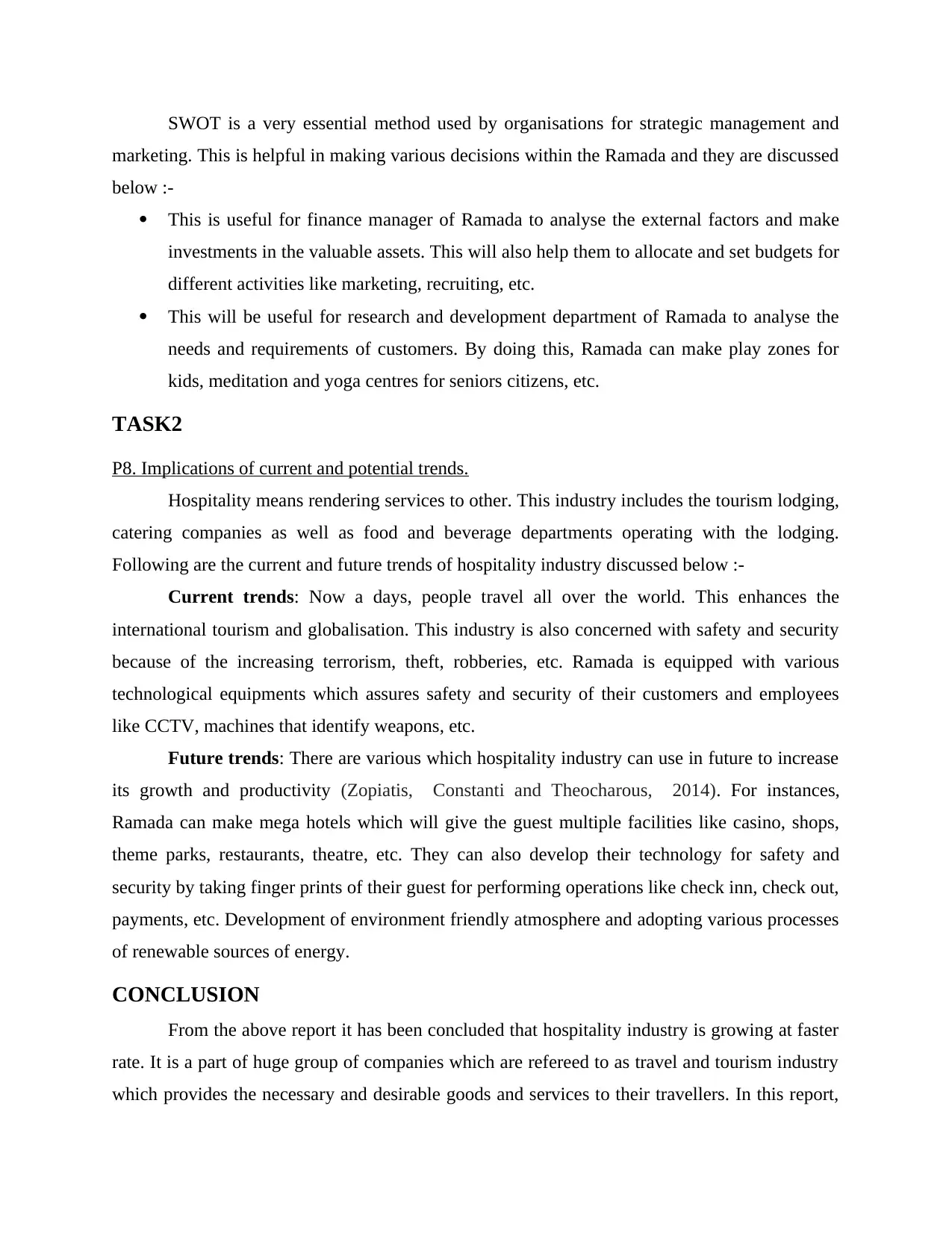
SWOT is a very essential method used by organisations for strategic management and
marketing. This is helpful in making various decisions within the Ramada and they are discussed
below :-
This is useful for finance manager of Ramada to analyse the external factors and make
investments in the valuable assets. This will also help them to allocate and set budgets for
different activities like marketing, recruiting, etc.
This will be useful for research and development department of Ramada to analyse the
needs and requirements of customers. By doing this, Ramada can make play zones for
kids, meditation and yoga centres for seniors citizens, etc.
TASK2
P8. Implications of current and potential trends.
Hospitality means rendering services to other. This industry includes the tourism lodging,
catering companies as well as food and beverage departments operating with the lodging.
Following are the current and future trends of hospitality industry discussed below :-
Current trends: Now a days, people travel all over the world. This enhances the
international tourism and globalisation. This industry is also concerned with safety and security
because of the increasing terrorism, theft, robberies, etc. Ramada is equipped with various
technological equipments which assures safety and security of their customers and employees
like CCTV, machines that identify weapons, etc.
Future trends: There are various which hospitality industry can use in future to increase
its growth and productivity (Zopiatis, Constanti and Theocharous, 2014). For instances,
Ramada can make mega hotels which will give the guest multiple facilities like casino, shops,
theme parks, restaurants, theatre, etc. They can also develop their technology for safety and
security by taking finger prints of their guest for performing operations like check inn, check out,
payments, etc. Development of environment friendly atmosphere and adopting various processes
of renewable sources of energy.
CONCLUSION
From the above report it has been concluded that hospitality industry is growing at faster
rate. It is a part of huge group of companies which are refereed to as travel and tourism industry
which provides the necessary and desirable goods and services to their travellers. In this report,
marketing. This is helpful in making various decisions within the Ramada and they are discussed
below :-
This is useful for finance manager of Ramada to analyse the external factors and make
investments in the valuable assets. This will also help them to allocate and set budgets for
different activities like marketing, recruiting, etc.
This will be useful for research and development department of Ramada to analyse the
needs and requirements of customers. By doing this, Ramada can make play zones for
kids, meditation and yoga centres for seniors citizens, etc.
TASK2
P8. Implications of current and potential trends.
Hospitality means rendering services to other. This industry includes the tourism lodging,
catering companies as well as food and beverage departments operating with the lodging.
Following are the current and future trends of hospitality industry discussed below :-
Current trends: Now a days, people travel all over the world. This enhances the
international tourism and globalisation. This industry is also concerned with safety and security
because of the increasing terrorism, theft, robberies, etc. Ramada is equipped with various
technological equipments which assures safety and security of their customers and employees
like CCTV, machines that identify weapons, etc.
Future trends: There are various which hospitality industry can use in future to increase
its growth and productivity (Zopiatis, Constanti and Theocharous, 2014). For instances,
Ramada can make mega hotels which will give the guest multiple facilities like casino, shops,
theme parks, restaurants, theatre, etc. They can also develop their technology for safety and
security by taking finger prints of their guest for performing operations like check inn, check out,
payments, etc. Development of environment friendly atmosphere and adopting various processes
of renewable sources of energy.
CONCLUSION
From the above report it has been concluded that hospitality industry is growing at faster
rate. It is a part of huge group of companies which are refereed to as travel and tourism industry
which provides the necessary and desirable goods and services to their travellers. In this report,
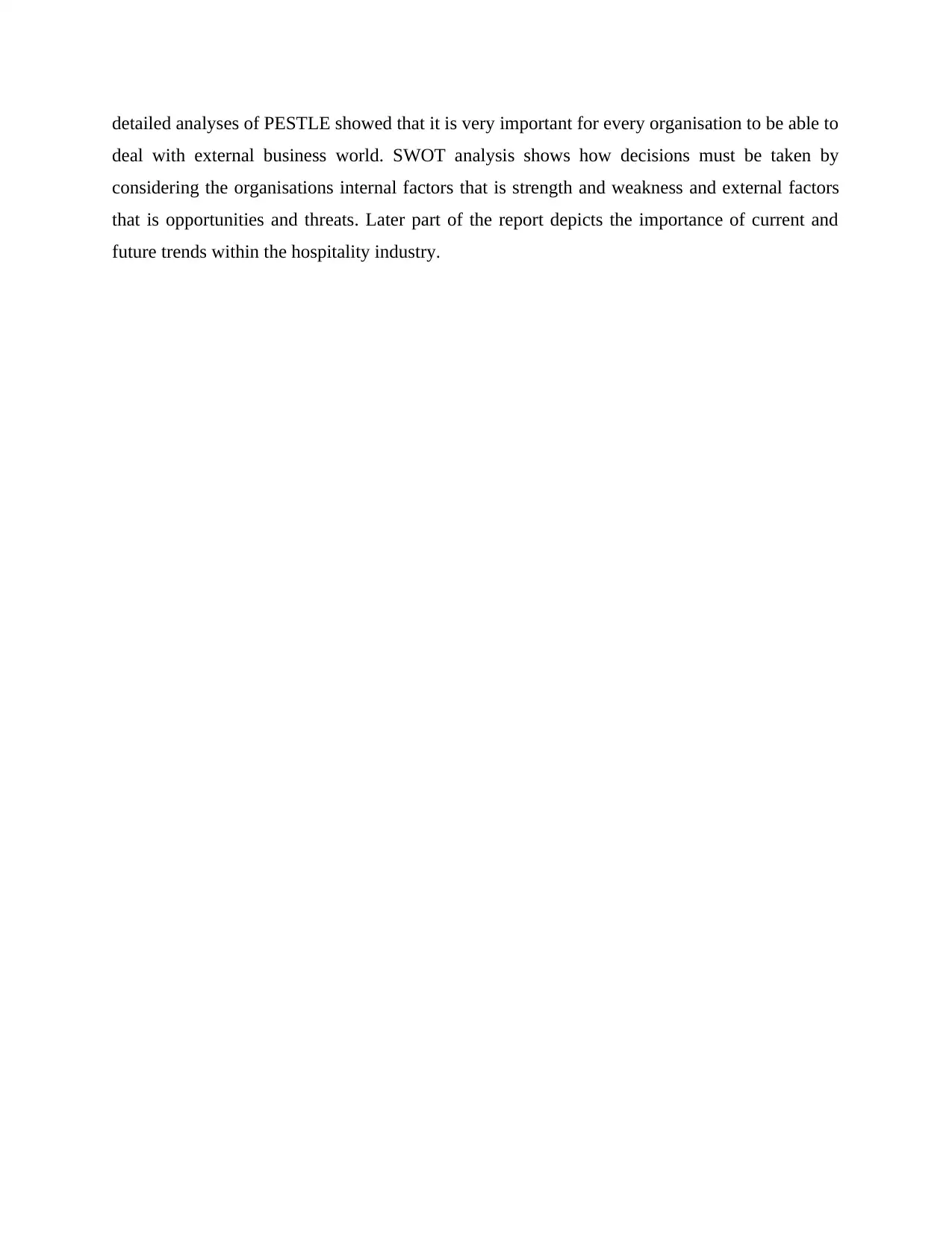
detailed analyses of PESTLE showed that it is very important for every organisation to be able to
deal with external business world. SWOT analysis shows how decisions must be taken by
considering the organisations internal factors that is strength and weakness and external factors
that is opportunities and threats. Later part of the report depicts the importance of current and
future trends within the hospitality industry.
deal with external business world. SWOT analysis shows how decisions must be taken by
considering the organisations internal factors that is strength and weakness and external factors
that is opportunities and threats. Later part of the report depicts the importance of current and
future trends within the hospitality industry.
⊘ This is a preview!⊘
Do you want full access?
Subscribe today to unlock all pages.

Trusted by 1+ million students worldwide
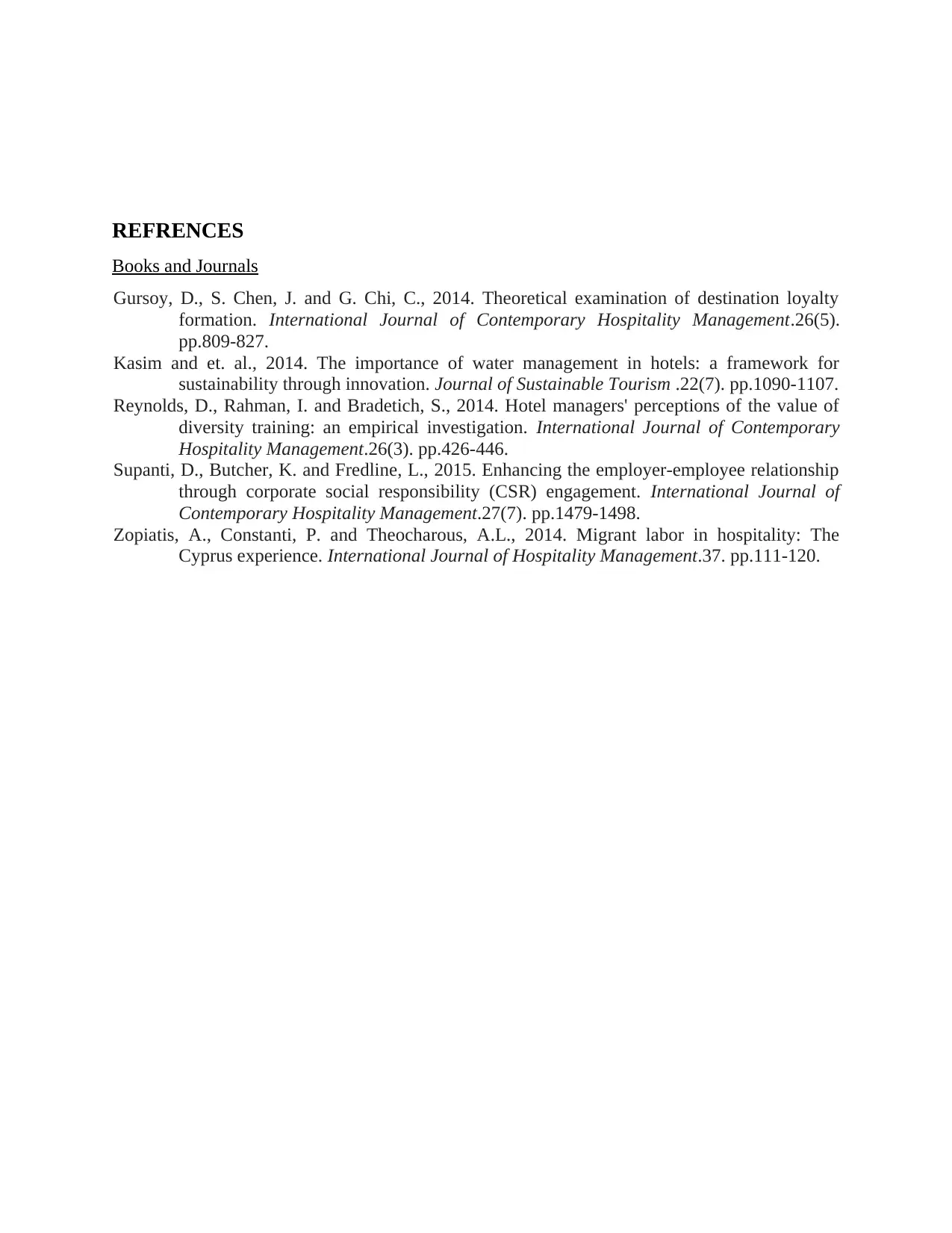
REFRENCES
Books and Journals
Gursoy, D., S. Chen, J. and G. Chi, C., 2014. Theoretical examination of destination loyalty
formation. International Journal of Contemporary Hospitality Management.26(5).
pp.809-827.
Kasim and et. al., 2014. The importance of water management in hotels: a framework for
sustainability through innovation. Journal of Sustainable Tourism .22(7). pp.1090-1107.
Reynolds, D., Rahman, I. and Bradetich, S., 2014. Hotel managers' perceptions of the value of
diversity training: an empirical investigation. International Journal of Contemporary
Hospitality Management.26(3). pp.426-446.
Supanti, D., Butcher, K. and Fredline, L., 2015. Enhancing the employer-employee relationship
through corporate social responsibility (CSR) engagement. International Journal of
Contemporary Hospitality Management.27(7). pp.1479-1498.
Zopiatis, A., Constanti, P. and Theocharous, A.L., 2014. Migrant labor in hospitality: The
Cyprus experience. International Journal of Hospitality Management.37. pp.111-120.
Books and Journals
Gursoy, D., S. Chen, J. and G. Chi, C., 2014. Theoretical examination of destination loyalty
formation. International Journal of Contemporary Hospitality Management.26(5).
pp.809-827.
Kasim and et. al., 2014. The importance of water management in hotels: a framework for
sustainability through innovation. Journal of Sustainable Tourism .22(7). pp.1090-1107.
Reynolds, D., Rahman, I. and Bradetich, S., 2014. Hotel managers' perceptions of the value of
diversity training: an empirical investigation. International Journal of Contemporary
Hospitality Management.26(3). pp.426-446.
Supanti, D., Butcher, K. and Fredline, L., 2015. Enhancing the employer-employee relationship
through corporate social responsibility (CSR) engagement. International Journal of
Contemporary Hospitality Management.27(7). pp.1479-1498.
Zopiatis, A., Constanti, P. and Theocharous, A.L., 2014. Migrant labor in hospitality: The
Cyprus experience. International Journal of Hospitality Management.37. pp.111-120.
Paraphrase This Document
Need a fresh take? Get an instant paraphrase of this document with our AI Paraphraser

1 out of 8
Related Documents
Your All-in-One AI-Powered Toolkit for Academic Success.
+13062052269
info@desklib.com
Available 24*7 on WhatsApp / Email
![[object Object]](/_next/static/media/star-bottom.7253800d.svg)
Unlock your academic potential
Copyright © 2020–2026 A2Z Services. All Rights Reserved. Developed and managed by ZUCOL.





